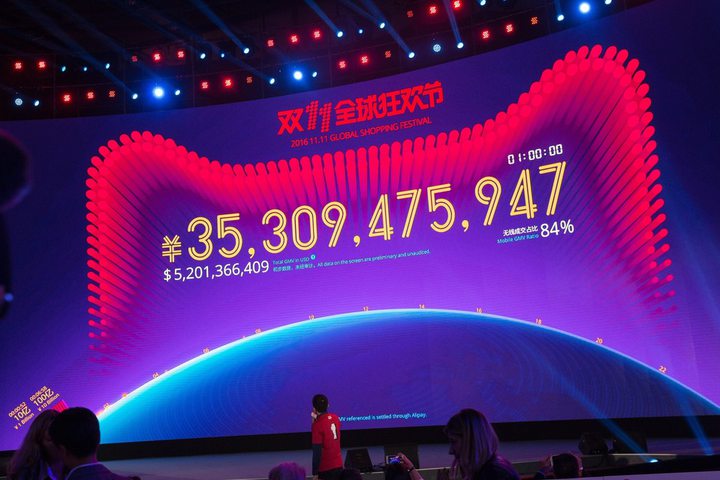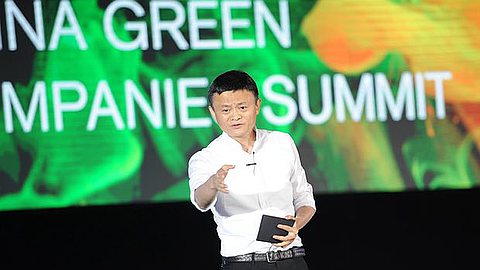Swinging Singles’ Day: Alibaba Holiday Drives Shoppers in China

Swinging Singles’ Day
She didn’t land the sneakers. But the Beijing resident found other ways to divest herself of 3,000 yuan ($441), nearly a third of her monthly salary, in 28 minutes, snatching up clothes from Zara, Uniqlo and other brands.
“These clothes won’t go out of fashion,” said Ms. Ke, 28, who works for a Chinese health-goods retailer. “They are stylish and the quality is good.”
As much of the world pondered the implications of a Donald Trump presidency, China dove headlong into a day of unabashed consumerism.
Singles’ Day was a tongue-in-cheek holiday begun by some Chinese young people in the 1990s to commemorate the lonely hearts among them, with the evocative date 11-11. Over the past seven years, Alibaba Group Holding Ltd. has commercialized the day into the world’s biggest annual shopping festival through savvy marketing and steep discounts.
Vendors sold some $14.3 billion worth of goods through Alibaba’s platforms on the day last year, dwarfing the numbers seen on the Black Friday and Cyber Monday shopping sprees that follow Thanksgiving in the U.S.
Alibaba topped that record at about 3:20 p.m. on Friday, with hours of shopping left to go. It will release a final figure for the day’s turnover after sales close at midnight.
To kick off this year’s event, Alibaba chairman Jack Ma used singing Chinese pop stars, strutting Victoria’s Secret models and celebrities including Scarlett Johansson, Kobe Bryant and David Beckham to fill a 60,000-person stadium in Shenzhen. The show was telecast live on video-streaming websites across China.
Singer Katy Perry canceled at the last minute, but there was still plenty to entertain the crowd. Comedians offered up one-liners while flying through the air on wires. There was a blimp and a helicopter. Mr. Ma performed magic tricks, asking guests to pick a card, any card.
As the sale got under way at 12:01 a.m. Friday, Alibaba kept a running tally of its sales on a massive screen at a press center set up near the stadium. Critics contend these numbers are inflated by orders that never ship or are quickly canceled, and Singles Day revenue has now come under scrutiny by regulators in China and the Security and Exchange Commission in the U.S., where Alibaba is publicly traded on the New York Stock Exchange.
Alibaba President Michael Evans said Friday that the company was confident in its numbers, which go through independent auditing. He said Alibaba was cooperating with the SEC.
Regardless of any possible smoke and mirrors, Chinese shoppers are the bright spot in the country’s slowing economy and they will increasingly spend overseas. The Economist Intelligence Unit forecast that Chinese private consumption will average 5.5% annual growth from this year through 2030, outpacing the overall economy.
Affluent consumers are China’s fastest-growing group, with the number of households earning more than 136,000 yuan a year expected to jump from 82 million last year to 137 million by 2020, according to Gavekal Dragonomics. They are eager to spend on luxuries like health and fitness goods, international tourism and SUVs. “The time to capitalize on the surging numbers of newly affluent Chinese households is now,” the research firm said in a report in May.
Ms. Zhang is one of the millions of China’s newly minted affluent consumers, and she took her job seriously. Starting weeks ago, Ms. Zhang would spend her lunch break at the mall, trying on blouses and sweaters and cross-checking them against listings of Singles’ Day sales. She identified a brand of French baby formula, Aptamil, and a yellow Zara mini windbreaker—gifts for her niece and nephew—that would be on sale on Singles’ Day.
“When I was a child, we would just buy all our clothes from the local store,” she said. “I didn’t start looking closely at brands until the last few years.”
Beijing resident Zou Xuanmo, 28, said she hunted for deals so thoroughly and systematically on Singles’ Day last year that she can’t participate this time around.
“I stockpiled so much boxed tissue, toothbrushes, toothpaste,” she said. “I’m still using it a year later.”
Singles Day poses something of a quandary for China’s government, which welcomes the shot in the arm to the economy but looks askance at rampant materialism.
The People’s Daily cautioned cadres ahead of time against lavish spending on designer watches and purses, and warned that any use of public funds was strictly forbidden.
But the event itself was characterized by escapist spectacle. At the kickoff gala, dancers traipsed around swinging colorful shopping bags. Mr. Ma did his card tricks, then made Ms. Johansson appear out of thin air from behind a curtain, David Copperfield style.
“It might be pure illusion, but that’s fine with me right now,” said Duncan Clark, founder of the consultancy BDA and author of a book about Alibaba, as the party came to a close.





